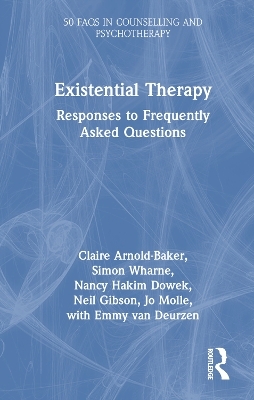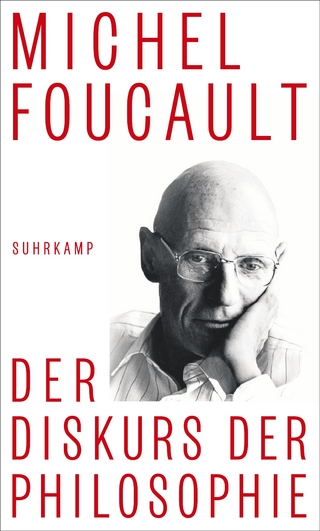
Existential Therapy
Routledge (Verlag)
978-1-032-40988-7 (ISBN)
In Existential Therapy: Responses to Frequently Asked Questions, the authors address those questions most frequently asked by potential clients of existential therapy or by people beginning their training or by those interested in counselling or psychotherapy.
The book is divided into five parts, with each focusing on responding to questions about different elements of existential theory and its practice and applications:
Part 1: Existential philosophy
Part 2: Existential method and theory
Part 3: Existential skills and practice
Part 4: Existential applications in different contexts
Part 5: Existential relevance to everyday life
The Q&A format, presented in accessible language, emphasises commonly unknown or misunderstood areas that are typically overlooked.
The book will appeal to a wide audience of potential clients and trainees, practitioners from other approaches, and those outside of the profession who are curious to understand more about existential therapy.
Claire Arnold-Baker is a counselling psychologist and existential psychotherapist with a private practice where she specialises in working with mothers. Emmy van Deurzen is an existential psychotherapist and counselling psychologist with a worldwide reputation. Neil Gibson is an existential psychotherapist and supervisor in private practice in Newcastle upon Tyne. Nancy Hakim Dowek is an existential psychotherapist and supervisor in private practice. Jo Molle is a chartered psychologist with a background in mental health research. Simon Wharne is a counselling psychologist and existential psychotherapist with a private practice.
Part 1: Existential philosophy: Questions about existential philosophical ideas 1. What is existentialism? 2. What are the main themes of existential philosophy? 3. Is existential therapy pessimistic? 4. What is the meaning of life? 5. Does existential philosophy only focus on the present? 6. Is existentialism more about individuals than societies? 7. What is an existential crisis? 8. Can existentialism exist alongside religious beliefs? 9. Does existential philosophy encompass all aspects of human existence? 10. Do clients need to know anything about existential philosophy? Part 2: Existential method and theory: Questions about existential psychology and psychotherapeutic work 1. Do existential therapists get you to think about death? 2. Do existential therapists work with the unconscious? 3. What is phenomenology? 4. What is the role of the therapist in existential therapy? 5. Do existential therapists believe in mental illness? 5. What is a mind and how is it seen through an existential lens? 6. What is Socratic Dialogue and how do existential psychotherapists use 7. Socratic Dialogue therapeutically? 8. What is the framework of Existential Psychotherapy? 9. Why have different schools emerged and what are the main differences? 10. How can philosophy help with emotional and psychological problems? Part 3: Existential skills and practice: Questions about the way existential therapists work 1. Are existential therapists free to work in any way they want? 2. Do existential therapists confront, ask questions and challenge more than other therapists? 3. Are existential therapists empathic? 4. Do existential therapists make interpretations? 5. Do existential therapists work with the past? 6. How do existential therapists work with dreams? 7. How do existential psychotherapists work with difference? 8. Is it possible to have short-term existential therapy? 9. What could you expect from an existential therapist in the first session? 10. What is the difference between existential therapy and existential coaching? Part 4: Existential applications in different contexts: Questions about how the existential approach can be used for different presenting issues and client groups 1. How do you formulate a case in existential therapy? 2. Is existential therapy helpful for clients suffering from depression and high levels of anxiety? 3. How does existential therapy conceptualise trauma? 4. How do existential therapists work with clients diagnosed with life limiting or terminal illness? 5. What is the existential view of loss and bereavement? 6. What is the existential perspective on addiction? 7. How do existential therapists work with clients with auditory and visual delusions / Psychosis? 8. How do existential therapists work with suicidal clients? 9. How do therapists work with chronic pain from an existential approach? 10. Do existential therapists work with couples or families? Part 5: Existential relevance to everyday life: Questions about the application of existential ideas to ordinary everyday living 1. How can we be free when life is full of duties, chores and obstacles? 2. Can people ever truly love each other, or are they always more selfish than caring? 3. Is authenticity about being selfish and doing what we want? 4. What is healthy/unhealthy living from an existential perspective? 5. What is the point to life if we are all going to die anyway? 6. Does it matter what meaning system I follow? 7. Will existential therapy/ideas make me happy? 8. Is it okay to self-harm or kill myself? 9. If anxiety is inevitable, how do we learn to live with it? 10. Are existential ideas still relevant to modern life?
| Erscheinungsdatum | 05.09.2023 |
|---|---|
| Reihe/Serie | 50 FAQs in Counselling and Psychotherapy |
| Verlagsort | London |
| Sprache | englisch |
| Maße | 129 x 198 mm |
| Gewicht | 680 g |
| Themenwelt | Geisteswissenschaften ► Philosophie ► Philosophie der Neuzeit |
| Medizin / Pharmazie ► Medizinische Fachgebiete ► Psychiatrie / Psychotherapie | |
| Sozialwissenschaften ► Soziologie | |
| ISBN-10 | 1-032-40988-6 / 1032409886 |
| ISBN-13 | 978-1-032-40988-7 / 9781032409887 |
| Zustand | Neuware |
| Informationen gemäß Produktsicherheitsverordnung (GPSR) | |
| Haben Sie eine Frage zum Produkt? |
aus dem Bereich


